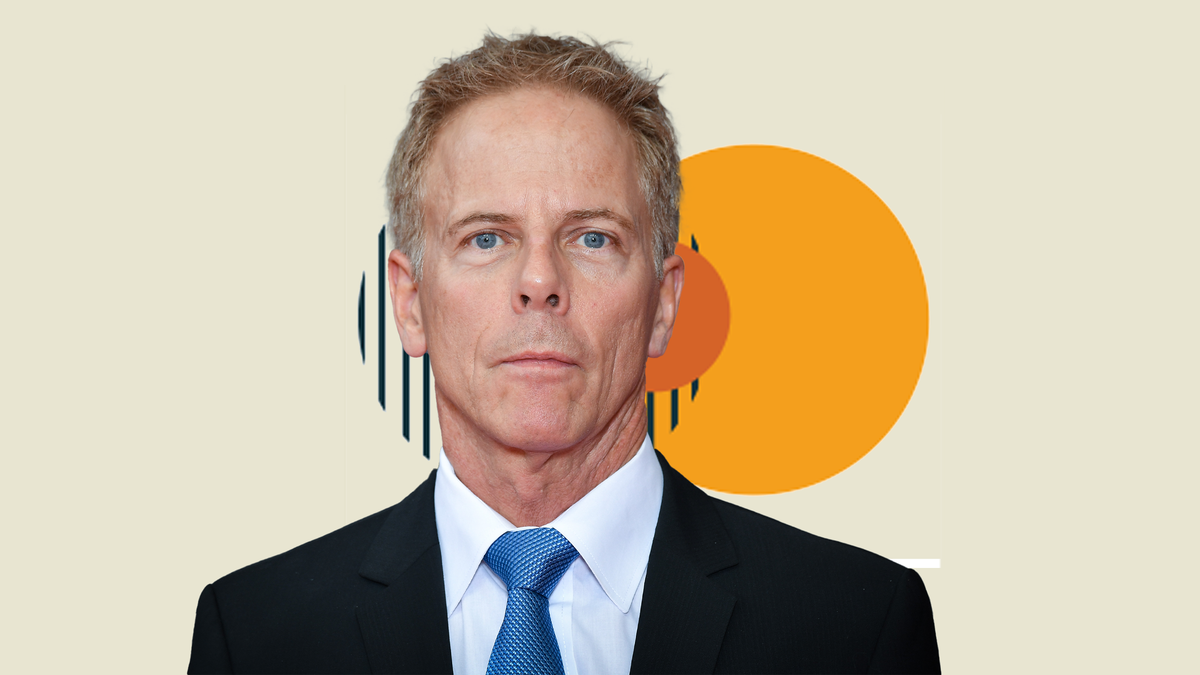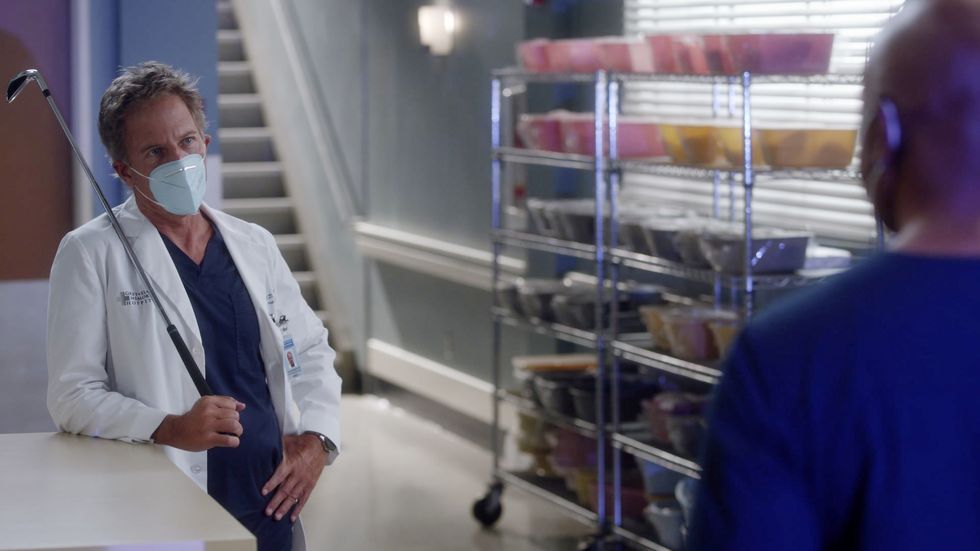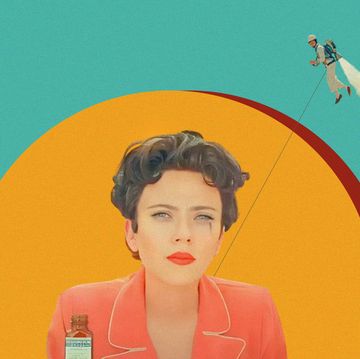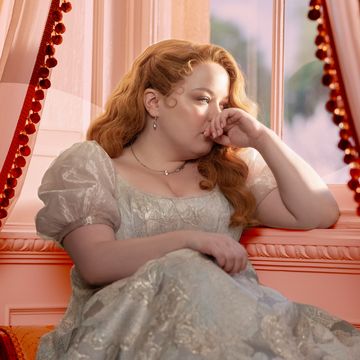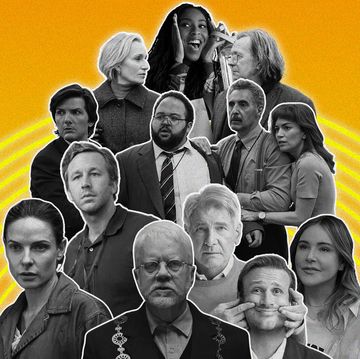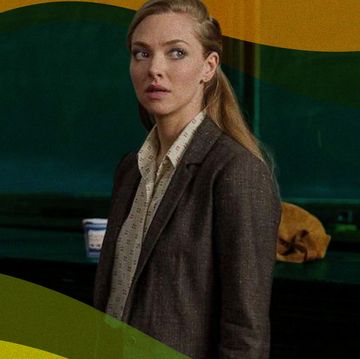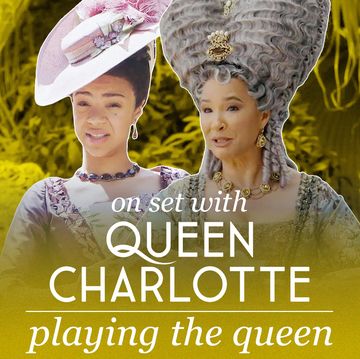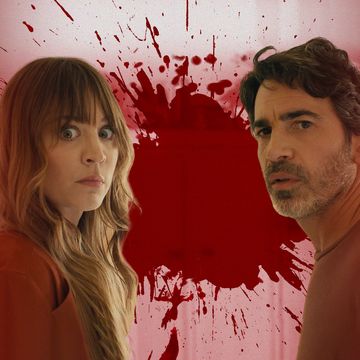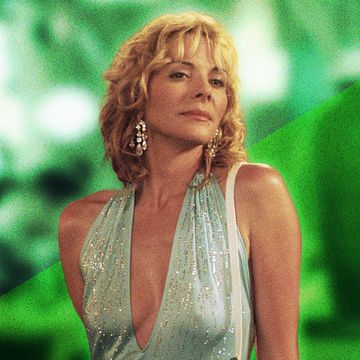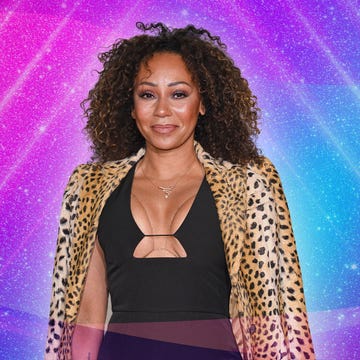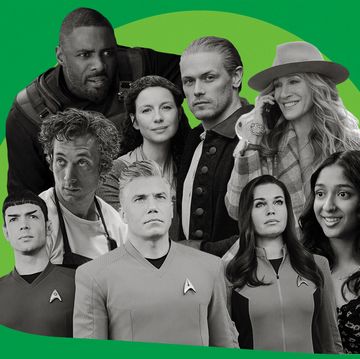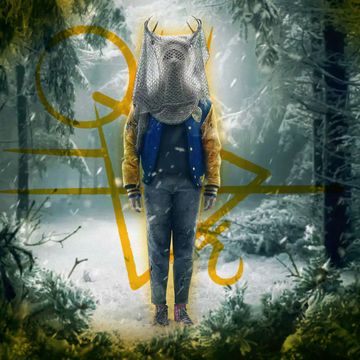Dr. Tom Koracick, played by Greg Germann, was only meant to be in a few episodes of season 14 of Grey’s Anatomy. As head of neurosurgery at Johns Hopkins, he’d trained Amelia Shepherd before she became head of neurosurgery at Grey Sloan Memorial. So, when Amelia got a brain tumor, she knew exactly who to call.
In the end, then, Germann would go on to play Koracick for three seasons of Grey’s Anatomy, making him a fan favorite, but in that way that you love to hate him. Now, after this week’s episode, “Tradition,” Koracick is off to different pastures. He’s decided to follow Jackson Avery out to Boston to dedicate the rest of his breathing days to helping to create a fair and just world for all. (Read actor Jesse William's thoughts on his big Grey's exit here.) Lofty heights, for sure, but if there is anyone who can pick something difficult to do and die trying, it’s Koracick.
“In this moment of Me Too and Black Lives Matter and all the things that are churning in the social and cultural conversation worldwide, but certainly here in the States,” says Germann, “this story line is so interesting to me. Here you have this middle-aged, successful white guy who’s saying, ‘I want to wake up,’ but the truth is, waking up is hard to do. He still carries all the baggage of preconceptions and [systemic injustice] that he’s trying to shed and to wake up from, but if this were a spinoff, say, that would be a wonderful thing to see him butt up against himself over and over again.”
Germann, whose breakout role on the legal comedy Ally McBeal made him a household name, says he’s never done a show where he didn’t expect to be killed off after a couple episodes. But his run on Grey’s has turned into something much more, and he’s admittedly become attached.
“At the same time, I never really quite felt like it’s mine because this show has been around for so long and I’m one of many actors who has kind of passed through,” he says. “So, it’s weird. It’s a new kind of feeling, both that this is exactly right and also, ‘Wait a minute; these are my people.’”
Below, Germann talks about how ingrained he becomes in his characters — so much so that when you say Koracick is arrogant, he doesn’t see it that way — how Koracick really feels about Teddy, and why he’s made such a big decision in his life.
VALENTINA VALENTINI: Tom Koracick is one of those characters who fans love to hate. Why do you think that is?
GREG GERMANN: I’m so in the bubble of who this guy is and has been that I don’t really think about what other people think about him. I stay away from that a little bit because, from my point of view, he’s trying to do the right thing. I accept maybe some people might think I’m a bit abrasive, but that’s their problem [laughs].
VV: Are you saying that as you, Greg, or you, Tom?
GG: Oh, that’s for you to figure it out! [Laughs.] No, when I think about these characters that I play, I’m in it. I mean, it’s not me, Greg; I am talking about the character, but it’s me. And as the actor, I certainly don’t read anything because I don’t want to know that somebody hates me; it’s all a lot of noise that can throw me off as far as what I’m trying to do, so I kind of stay away from that. So, speaking as the character, I suppose I’d say, yeah, I’m aware that some people find me a bit abrasive, but I’m just telling the truth. If you don’t like it, sorry, but the best idea wins. If you can’t stand the heat, get out of the operating room.
VV: Because you don’t read reviews or recaps and aren’t on social media, do you even know if Koracick has a group of loyal fans?
GG: If there is a fan out there, I’m thrilled! But I don’t know — is there? Hopefully, there would be a few; I don’t know.
VV: Koracick has moments of empathy, and even sympathy, but he is kind of a cantankerous guy, no?
GG: Again, I don’t want to be uncooperative, but I don’t think of him as cantankerous — that would be somebody else’s interpretation of him. The way I think about it, as an actor, is that you don’t ever play a villain; you never play a bad guy. You’re playing somebody who’s trying to do something or wants something. I’m just trying to get at that the best way I can, and somebody else will judge it. However, that’s kind of on them. But to try and address what you’re saying — I’m a brain surgeon, and it’s a very difficult and high-pressure job with a lot of politics involved and a lot of opinions about what the right steps forward may or may not be. When I first started on the show, [co-executive producer] Linda Klein set me up to sit in on about four or five brain surgeries at different hospitals around Los Angeles. I got to scrub in and was in the operating room. It was fantastic. Right away, I saw that in that profession, when you’re collaborating with a lot of people, there are a lot of different opinions and lots of politics involved. So, Tom Koracick, like any really good surgeon, is going to offend some people, I suppose, because he’s very good at what he does and he is going to have an idea about what should and shouldn’t happen. And, for some people, they’re going to feel like that’s arrogant or conceited or something. But, from my point of view, I’m not. I know the right thing to do, and I’m going to do it. If someone thinks that makes me cantankerous or grating or abrasive, I’m going to go save a life regardless. Catch up to me when you’re ready.
VV: Fair enough! Now, Teddy and Tom’s long on-and-off affair — ultimately, were they meant to not be together?
GG: On any given day, so many things happened. Look, I think Tom really loved her, probably still does. I’ve said it previously to Teddy that I accept what this is and I’m still here and I’m going to be your friend because I love you enough that I’m going to do that. Tom really loves her, really hears her, sees her. Should they be together? Shouldn’t they? That’s kind of a philosophical question almost. And I hate to be so not responsive to your question, but it’s a bit like, if they are together, they should be. If they’re not, I think Tom would get to the place where he’d accept that maybe they shouldn’t be. But I’m still here, and I’m never going away — even if I’m in Boston or Paris, if Teddy called me, I would be there.
VV: Do you think that Koracick leaves behind a certain legacy — either on the show itself or in the fictionalized world of Grey Sloan Memorial?
GG: As the actor playing Tom, I hope both things are true. That’s maybe a Krista Vernoff or Shonda Rhimes question [laughs]. I don’t think Grey’s Anatomy has had a character like Tom on the show, which is great. And, to Krista’s credit, when they created the character, they gave me something amazing to work with. The best example of this for me is when a role was created for me in Stephen Sondheim’s Assassins. Sondheim is the greatest living musical-theater composer, so if he writes a song for your character and if you just hit the notes, the dynamics, the crescendos, and so on, you’re going to sound and look like you’re really, really good. So, when they created this character before I even showed up on the set, I think they created something that’s really unique and original to the show. When Krista and I had a discussion about how the story line was going to go for Tom and his resolution, she said, “I’m not killing him off because he’s going to come back next year a few times.” So, I hope as an actor there’s a bit of a legacy.
VV: This resolution, the decision Koracick makes, it feels very different for him, and yet it feels right. Whatever it is, it’s quite a move.
GG: It’s certainly a move. When Tom came to Grey’s, his son was gone, and he was clearly a bit lost. He’s made a couple of big moves in the last five years, 10 since he lost his son. This move that he’s making now, although I think what you’re implying is that it might seem a bit out of character, but from the very beginning he’s been searching to find this equilibrium again that he feels like he had with his son and his wife at the time. That’s a bit of what Teddy’s about, I think. Especially when she was pregnant, he was really ready to jump in with both feet into that arrangement. Now, he’s survived a pandemic, and he wants to wake up. That doesn’t mean he has woken up, but that’s something that’s consistent with him throughout — like when you see him praying, there’s a part of him that’s really struggling to be true to a deeper place in himself and not let the pain or the loss that he’s experienced pull him under, whether it’s losing a son, or losing Teddy, or potentially losing his life to Covid.
VV: Regarding Koracick’s Catholicism — this move actually feels very faith-based, like religion at its best, helping those less fortunate. Does that ring true to you?
GG: I didn’t quite think of it that way, but his faith, whatever that means to some, his core belief, is intertwined with science. I remember there was a scene where I was in a pew sort of talking to my son; in another scene, I had a rosary. As much as I am a person of science, there are things that are beyond my understanding or control, and I am willing to acknowledge that I’m not all-powerful. There’s humility. Again, this is to Krista and the writers for creating this, not to me, but it’s so unique and fun to play when, on the one hand, as you described, there are some people who might find him arrogant or grinding or whatever, but there’s also this humility. And that’s where my faith might come into it, my desire to wake up despite the fact that I might never really get there. If there was a spinoff in Boston, he gets there, and I’m still the same guy. I’m still going to make all kinds of big mistakes, but my intention is to try to do the right thing. I’m still my own biggest obstacle.
VV: Did you think at any point that they were maybe going to kill off Koracick when he had Covid?
GG: From the second episode I did, I thought that they’d probably kill off Koracick! I mean, there’s still a chance — we might find out in the first episode of next season that there was a plane crash and Koracick dies!
VV: I’m laughing, but of course that’s not funny.
GG: After this interview, we could find out that you showed them what I said, and now they’re definitely going to kill him off.
VV: [Laughs] How did you find out that this was going to be the end?
GG: This interview. It’s awkward for both of us now [laughs]. You know, I’m an actor, and it’s rare to stay very long in one thing. A play, two or three months. A movie is a month or two. A TV show, if you’re lucky, has a season and sometimes two or three. This show is going into its 18th season. For any profession, especially with the gig economy now, that just doesn’t ever happen. So, when Krista called me months ago, it’s not like I was really surprised. Disappointed, certainly, because I love this job.
VV: What have been some of your most memorable moments working on the show?
GG: When we have to do the scenes in the operating room. They’re really edifying and wonderful, led by Linda Klein and the technical crew around us. Often, there’ll be a real brain surgeon there playing my second, so I’m always learning a lot. But it’s also very intimidating because there’ll be a close shot of what you’re doing in there, and, because of how realistic it looks — and I’ve been in real brain surgeries, so I know it looks; it looks just like that — that’s terribly intimidating because on some level you feel like you’re doing real brain surgery, and if you were, you would have killed this person over and over again. Those scenes, they’re a little funny and horrifying [laughs].
VV: And what are you most looking forward to now that you’re leaving the Grey Sloan family full-time?
GG: I’ve done a lot of theater in New York, but I’d been telling my agent for the last year or so before Covid that the next thing I’d like to do is to go to London to do a play. I think it was the week that I did what I thought was my final episode, and he called me with this opportunity at the Soho Theatre, a play called Herding Cats by Lucinda Coxon. It’s so serendipitous that it happened this way. It’s a very ambitious thing that they’re doing — it will be live at the theater and live here too; I’ll be live-streamed into the theater. It’s incredible. And when it all opens up more, I told them in London that I said I’d do this but only under the condition that they bring me to London to do a play in person. They’ve guaranteed that, so let’s hope they’re not just blowing smoke!
Valentina Valentini is a London-based entertainment, travel, and food writer and also a Senior Contributor for Shondaland. Elsewhere she has written for Vanity Fair, Vulture, Variety, Thrillist, Heated, and The Washington Post. Her personal essays can be read in the Los Angeles Times, Longreads, and her tangents and general complaints can be seen on Twitter at @ByValentinaV.
Get Shondaland directly in your inbox: SUBSCRIBE TODAY
